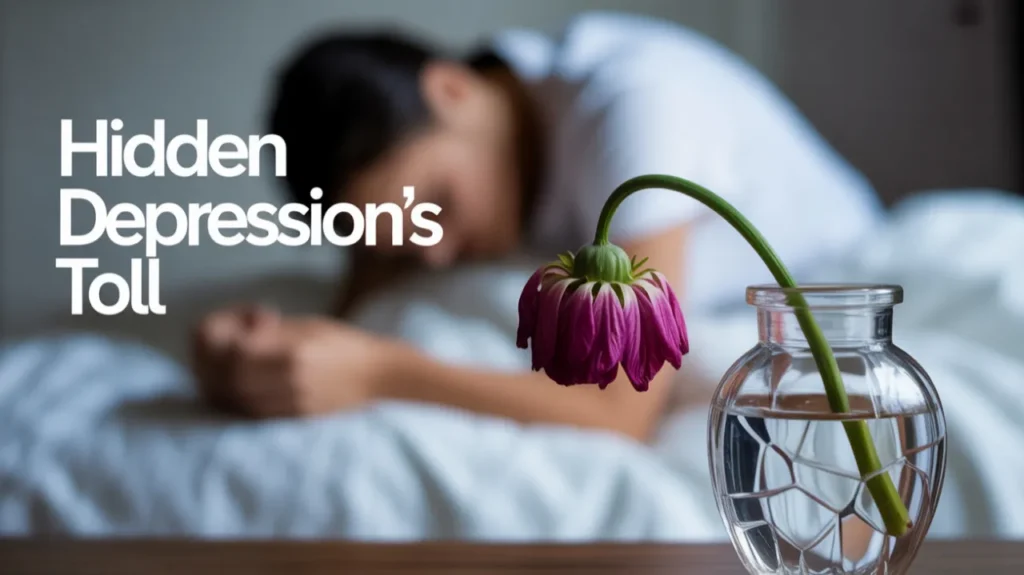High Functioning Depression
High functioning depression is a term used to describe individuals who appear fine on the surface but suffer deeply inside. These individuals may excel at work, maintain relationships, and meet responsibilities while struggling with emotional pain. The condition is real, often misunderstood, and can lead to serious health risks when left untreated.
What Is High Functioning Depression?
High functioning depression refers to persistent depressive symptoms that don’t fully debilitate a person’s daily life. The term is not an official diagnosis in the Diagnostic and Statistical Manual of Mental Disorders (DSM-5), but it closely resembles dysthymia, also known as persistent depressive disorder.
Functional Depression Meaning
Functional depression means a person can function outwardly—attending school, work, or social events—while experiencing chronic sadness, fatigue, and lack of motivation. This differs from major depressive disorder, which often causes more severe disruption in daily activities.

Signs of Functional Depression
Common functional depression symptoms include low energy, sleep disturbances, and persistent sadness. Individuals may appear successful or put together but experience irritability, guilt, and emotional numbness internally.
Functional Depression Signs to Recognize
- Ongoing insomnia or oversleeping
- Decreased appetite or weight changes
- Constant headache or body aches
- Reduced interest in enjoyable activities
- Constant stress, even in routine tasks
- Struggling to feel real emotion
- Hiding pain behind humor or perfectionism
These symptoms can be masked by productivity, making functioning depression hard to detect.
Causes and Risk Factors
High functioning depression may stem from a mix of biological, psychological, and environmental causes. Brain chemistry, past trauma, and chronic stress can increase risk.
Genetic and Environmental Links
A family history of mood disorders, bipolar disorder, or addiction may increase vulnerability. Prolonged exposure to emotional neglect or unrealistic parent expectations can also contribute. Stressful environments and poor eating patterns may also trigger depressive episodes.
Functional vs. Low Functioning Depression
Low functioning depression often leads to missed obligations, social withdrawal, and visible dysfunction. High functioning depression allows someone to appear “fine” while hiding real distress.
Functional vs. Low Functioning: Key Differences
- Low functioning depression visibly impacts daily life.
- High functioning depression hides under achievement and social engagement.
- Both types carry equal risk of relapse, suicidal ideation, and worsening health.
Mental and Physical Health Impacts
Left untreated, functional depression may affect quality of life and physical health. Chronic fatigue, headache, and even diabetes may develop.

Mental Health Struggles
Symptoms often include anxiety, fear, and anger outbursts. People may develop anxiety disorder, psychosis, or substance abuse issues as coping methods. Some rely on binge eating or may experience weight gain from poor diet and limited physical activity.
The Anxiety and Depression Association of America states that mental health issues like anxiety and depression frequently occur together. This co-occurrence, known as dual diagnosis, presents greater treatment challenges but can be managed with proper care from a mental health professional.
Functional Depression in Relationships and Parenting
People with high functioning depression often feel isolated in their relationships. They may smile in social settings but feel empty when alone. This emotional disconnect can lead to frustration, arguments, or withdrawal from partners.
Parenting While Depressed
Parents with functional depression may still meet their children’s physical needs but struggle with emotional availability. They may feel guilty or overwhelmed, which can strain the parent-child relationship. If untreated, these patterns may model unhealthy emotional behavior for children.
Diagnosis and Mental Health Assessment
A mental health professional or licensed psychiatry provider can conduct an evaluation using the DSM-5 criteria. This may include interviews, questionnaires, and a full health screening.
Diagnosis Criteria
- Symptoms present most days for at least two years
- No extended periods without symptoms
- Emotional symptoms are chronic but not severe enough to halt daily functioning
Many patients go undiagnosed because their struggles are hidden behind achievement. However, recognizing functional depression early improves outcomes and reduces the chance of relapse, addiction, or suicidal thoughts.
Treatment for High Functioning Depression
Functional depression treatment combines therapy, medication, and lifestyle changes. At Revival Mental Health in Orange County, we offer evidence-based approaches for both major depressive disorder and dysthymia.
Therapy Options
- Cognitive Behavioral Therapy (CBT) to reframe negative thoughts
- Dialectical Behavior Therapy (DBT) to manage emotion and reduce relapse
- Dual diagnosis support when depression coexists with substance abuse, anxiety disorder, or bipolar disorder
Therapy can help patients identify harmful patterns, improve emotional regulation, and build strategies to prevent relapse. Group therapy may also offer community support and accountability.
Medication and Psychiatry
A qualified provider may prescribe an antidepressant such as an SSRI or SNRI. These medications regulate serotonin reuptake to stabilize mood, ease anger, and reduce fatigue. Patients should work closely with their mental health professional to monitor side effects, including weight gain, appetite changes, or emotional blunting.
Lifestyle and Coping Strategies
Treatment doesn’t stop with medication. Incorporating a healthier lifestyle helps restore brain function and emotional balance.
Effective Coping Tips
- Create a regular sleep routine to support energy levels
- Practice mindful eating to stabilize blood sugar and emotional regulation
- Use daily movement or exercise to boost natural dopamine and serotonin
- Limit alcohol and drug use to reduce substance abuse risk
- Journal or practice meditation to improve self-awareness
- Stay connected with trusted friends, support groups, or a therapy team

Therapy Goals and Long-Term Outlook
The long-term goal of treating functional depression is to improve quality of life and prevent future mental health deterioration. Through therapy, individuals learn how to process emotions, reduce self-sabotage, and recognize when they need help.
A structured care plan may include ongoing psychology sessions, medication adjustments, and periodic wellness checks with a health professional. For some, progress may take months. For others, years. But early treatment lowers the chances of severe mood disorder, suicidal actions, or psychosis.
When to Seek Help
If symptoms persist or interfere with emotional or physical health, seek help. Reach out to the Suicide and Crisis Lifeline by dialing 988 for immediate support. At Revival Mental Health, we help clients identify functional depression and develop treatment plans rooted in psychology, psychiatry, and long-term healing.
Mental health conditions like dysthymia, major depressive disorder, and seasonal affective disorder are medical conditions—not personality flaws. The sooner someone receives appropriate care, the more likely they are to recover and maintain a healthy, functional life.
FAQs
1. Is high functioning depression more common in high achievers? Yes. Many high performers use work to mask pain, leading to unrecognized emotional struggles.
2. Can functional depression lead to substance abuse? Absolutely. Some people use alcohol or drugs to self-medicate, which can lead to addiction or dual diagnosis.
3. Is seasonal affective disorder a form of high functioning depression? SAD is a specific mood disorder that may overlap with high functioning symptoms, especially during winter.
4. Are people with high functioning depression at risk for suicide? Yes. Despite appearing stable, they may experience suicidal ideation, making early suicide prevention efforts vital.




